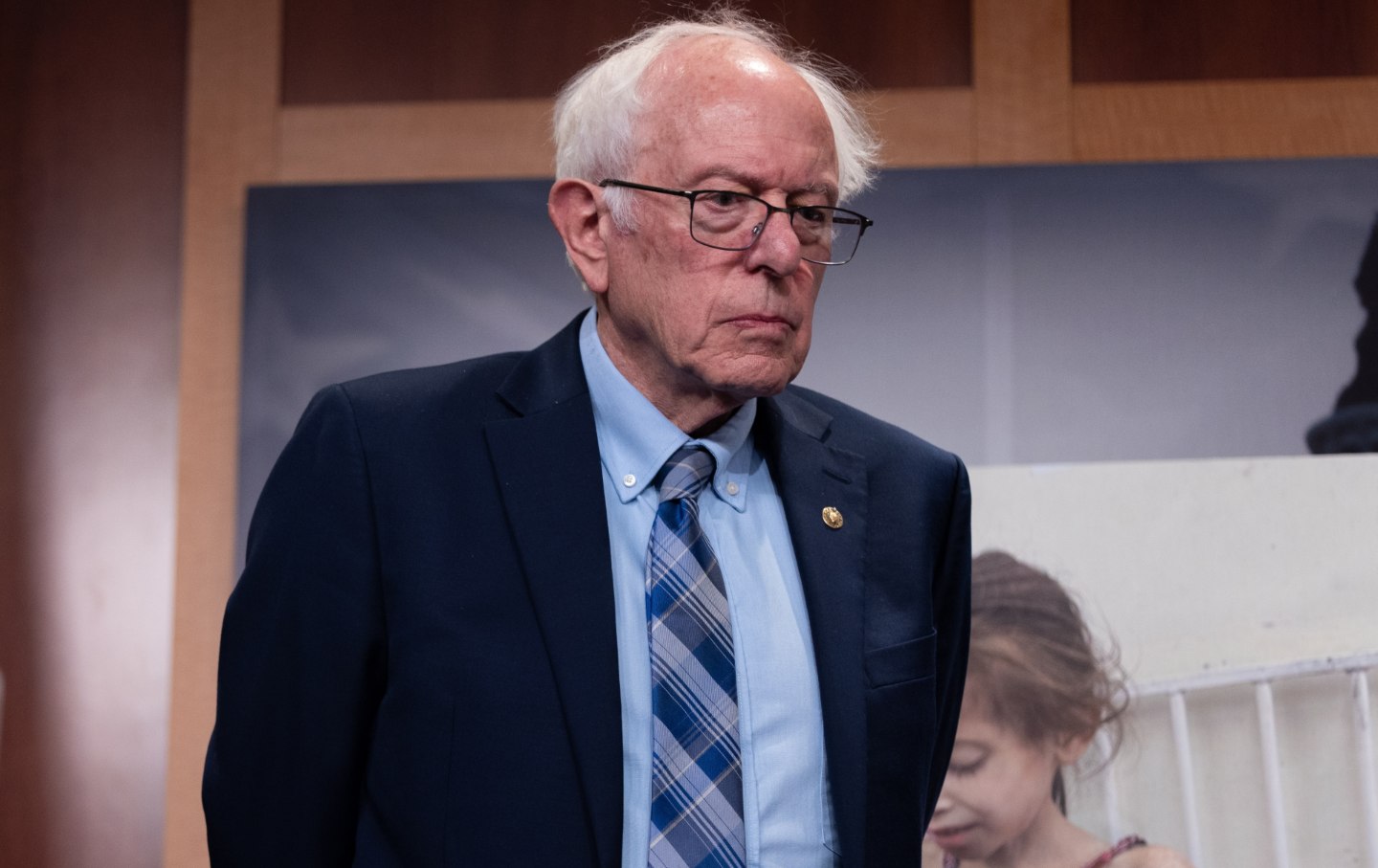What the “Uncommitted” Campaign Has Already Won
We now know for sure: The movement was President Biden’s most powerful rival in the 2024 primaries. And it’s bringing that strength to the DNC in Chicago.

Pro-Palestinian protesters gathering outside the White House on June 8, 2024.
(Aashish Kiphayet / Middle East Images / AFP via Getty Images)The final Democratic presidential primaries were held on June 5, meaning that the campaign to send a message to President Biden about the need to change course on Gaza by casting “uncommitted” or “no preference” ballots got one last chance to flex its muscles. Activists seized that chance.
They won another 65,000 votes and at least one more Democratic National Convention delegate (from New Jersey) in a single day—bringing the overall national vote total for the campaign to 703,897. Add in write-in and blank-ballot protests in states that lacked an “uncommitted,” “uninstructed,” or “no preference” option, and it is certainly reasonable to assume that the number of Democratic primary voters who made a conscious effort to shift Biden’s Gaza stance was closer to three-quarters of a million.
Since launching in February, with a big showing in the battleground state of Michigan that shocked pundits and Biden campaign strategists, the “uncommitted” movement has gone from strength to strength. Strong results in Michigan (13 percent) and Minnesota (19 percent), both states with substantial Muslim American populations, prodded the Biden administration to adopt a somewhat more critical stance regarding Israel’s brutal assault on Gaza, which has killed close to 37,000 Palestinian men, women, and children, destroyed the region’s civilian infrastructure, and raised fears of mass starvation.
The “uncommitted” movement has also stiffened the backbone of members of Congress who had been cautious about calling for a cease-fire. And it looks to have won as many as 36 delegates to this summer’s Democratic National Convention in Chicago.
Of course, Biden secured most of the votes in the primaries, and most of the delegates, as would be expected of any incumbent president. He’ll be the nominee; his team controls the planning for the convention, and they will dominate its processes. However, the “uncommitted” movement has enough allies among members of Congress and other elected officials, as well as activists, to form a smaller but still potentially significant pro-cease-fire presence as Democrats gather in Chicago. Whether the Biden camp will allow open dissent on the convention floor remains uncertain—and, by most accounts, unlikely. But the president and his team would be foolish to neglect the important signal that’s been sent by “uncommitted” voters.
Here’s why:
1. The anti-war movement has proven to be more resilient and popular than any of Biden’s rivals for this year’s Democratic presidential nomination. For instance, it’s won roughly 150,000 more votes than Dean Phillips, a sitting member of Congress whose largely self-financed campaign raised and spent roughly $7.5 million to campaign in early primary states. It’s won almost 200,000 more votes than author Marianne Williamson, whose 2020 campaign attracted support in a number of states from critics of Biden’s support for Israeli Prime Minister Benjamin Netanyahu’s decision to respond to Hamas’s October 7 attack with what many international observers have described as a genocidal assault on civilians in Gaza. (Notably, if the votes for various “uncommitted” options on state ballot lines are combined with those cast for Williamson before and after her exit from the race, the total exceeds 1.1 million.)
2. The overall “uncommitted” vote total from this year’s primary campaign has been significantly higher than the totals for contenders who, at different stages in the race for the 2020 Democratic presidential nomination, were seen as credible prospects—including Minnesota Senator Amy Klobuchar, New Jersey Senator Cory Booker, former Texas representative Beto O’Rourke, and then–California Senator Kamala Harris, who would go on to become Biden’s vice president. The popular vote for “uncommitted” options this year was several hundred thousand votes below that cast for former South Bend mayor (currently the secretary of transportation) Pete Buttigieg, one of Biden’s top 2020 rivals and a prospective 2028 presidential candidate; but the percentage of the overall vote total that went “uncommitted” in 2024 actually exceeded Buttigieg’s 2020 percentage. Notably, the Buttigieg campaign spent close to $90 million, an exponentially higher figure than the grassroots “uncommitted” campaign mustered up.
3. The “uncommitted” movement has revealed Biden’s vulnerability on the Gaza issue in states that he will need to win in November. In the ultimate battleground state of Wisconsin, for instance, the April Democratic primary saw the “uninstructed delegation” option win 48,162 votes—8.3 percent of the statewide total—which is more than double Biden’s 2020 margin of victory. In Dane County, the Democratic heartland that contains the state capital, Madison, and is absolutely essential to the party’s November prospects, almost 15 percent of voters cast “uninstructed” ballots, and many precincts in Madison registered support in excess of 30 percent. In the state’s most populous county, Milwaukee, 12.2 percent of voters backed the “uninstructed” option. The movement also secured strong votes in some rural regions. For instance, in the small western Wisconsin city of Viroqua (population 4,450), “uninstructed” won almost 22 percent of the vote.
4. “Uncommitted” vote totals from key states have illustrated the seriousness of the problem that Biden and the Democrats have with young voters. In Michigan, for example, the “uncommitted” vote in Washtenaw County, where the University of Michigan (Ann Arbor) and Eastern Michigan University (Ypsilanti) are located, was over 17 percent. As in southeastern Michigan cities such as Dearborn that have large Muslim American populations, “uncommitted” actually won several Washtenaw County precincts. In Wisconsin, the numbers were just as striking. “This is a big, f**king deal,” declared US Representative Mark Pocan, a Wisconsin Democrat, after learning that more than 30 percent of voters in precincts where University of Wisconsin–Madison students reside had answered the call of the “Listen to Wisconsin” coalition of Muslim, Jewish, and Christian activists to “[take] urgent action—with our ‘uninstructed’ votes this April—to shift American policy toward an agenda of justice in Gaza.” The UW campus has been a vital base of strength for Democrats in recent presidential elections in Wisconsin, a state where Biden beat Republican Donald Trump in 2020 by barely 20,000 votes. That’s one of the reasons political observers noted that, in a key campus precinct, support for the “uninstructed delegation” option hit 48 percent, tying Biden’s total. The headline from The Daily Cardinal, a campus newspaper, told the story: “In warning for Biden, UW-Madison area wards vote uninstructed at nearly 4x statewide rate.”
5. “Uncommitted” delegates will form a significant presence in several state delegations to the Democratic convention, including 11 from Minnesota, eight from Kentucky, and seven from Hawaii. There will be smaller blocks of delegates from Massachusetts, Michigan, Missouri, New Jersey, Rhode Island, and Washington State. In combination with pro-cease-fire elected officials who could be part of those state delegations, such as Minnesota US Representative Ilhan Omar, Michigan US Representative Rashida Tlaib, Missouri US Representative Cori Bush and Washington US Representative Pramila Jayapal, “uncommitted” blocks within delegations could actually be more influential than was initially anticipated. This also goes for states that are not sending any “uncommitted” delegates but are still likely to have delegates who are supportive of Biden but also are deeply committed to promoting a cease-fire in Gaza and otherwise shifting US policy in the Middle East.
What does this all add up to? A challenge for convention planners. There is always a tendency on the part of an incumbent president and his team to try to control a convention so tightly that there is no evidence of dissent. But the desire for an honest debate on Gaza is real, as is the desire for a shift in the president’s position. After more than 40,000 New Jersey voters chose the “uncommitted” option last Tuesday—giving the movement a striking 18 percent in one populous county with a large Palestinian American population (Passaic), former New Jersey state representative Sadaf Jeffer said, “It shows what many have been saying, that [there] is significant dissatisfaction with President Biden’s approach to Gaza. This is a constituency Democratic Party leadership and the Biden administration must engage.”
We cannot back down
We now confront a second Trump presidency.
There’s not a moment to lose. We must harness our fears, our grief, and yes, our anger, to resist the dangerous policies Donald Trump will unleash on our country. We rededicate ourselves to our role as journalists and writers of principle and conscience.
Today, we also steel ourselves for the fight ahead. It will demand a fearless spirit, an informed mind, wise analysis, and humane resistance. We face the enactment of Project 2025, a far-right supreme court, political authoritarianism, increasing inequality and record homelessness, a looming climate crisis, and conflicts abroad. The Nation will expose and propose, nurture investigative reporting, and stand together as a community to keep hope and possibility alive. The Nation’s work will continue—as it has in good and not-so-good times—to develop alternative ideas and visions, to deepen our mission of truth-telling and deep reporting, and to further solidarity in a nation divided.
Armed with a remarkable 160 years of bold, independent journalism, our mandate today remains the same as when abolitionists first founded The Nation—to uphold the principles of democracy and freedom, serve as a beacon through the darkest days of resistance, and to envision and struggle for a brighter future.
The day is dark, the forces arrayed are tenacious, but as the late Nation editorial board member Toni Morrison wrote “No! This is precisely the time when artists go to work. There is no time for despair, no place for self-pity, no need for silence, no room for fear. We speak, we write, we do language. That is how civilizations heal.”
I urge you to stand with The Nation and donate today.
Onwards,
Katrina vanden Heuvel
Editorial Director and Publisher, The Nation








